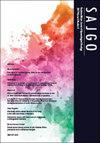Knowledge, awareness and attitude towards human papilloma virus vaccine in a resource-constrained setting: a comparison between an urban and rural population in South Africa
IF 0.3
Q4 OBSTETRICS & GYNECOLOGY
Southern African Journal of Gynaecological Oncology
Pub Date : 2019-01-02
DOI:10.1080/20742835.2019.1589183
引用次数: 4
Abstract
Objectives: This study compared the knowledge, awareness and attitude towards the human papilloma virus (HPV) vaccine between urban and rural population groups. Materials and methods: A comparative and descriptive study was undertaken of 200 women attending gynaecological services in the Pietermaritzburg Hospitals Complex. A systematic random sampling and interview-administered questionnaire was conducted. The study analysed demographic data and compared the similarities/differences in terms of awareness, knowledge, attitude and uptake of HPV vaccine between the groups. Results: Some 29% of urban participants as compared with 27% of rural participants knew about HPV; 72% lacked knowledge and awareness of HPV (71.0% urban and 73% rural). Of the urban population, 12% knew that HPV vaccine existed and protected against HPV transmission, 54% did not know, whilst 34% wished to know more. Only 7% of the rural population knew that the HPV vaccine existed and protected against HPV transmission, 57% did not know and 36% expressed the wish to know more. Overall 25% of the participants agreed on HPV vaccine safety (urban, 28 vs. rural, 22), while among the rest of the participants 75% were unsure. In total 57% of participants were unsure as to whether the HPV vaccine could encourage sexual promiscuity (urban, 56 vs. rural, 59), 21 urban dwellers agreed that the HPV vaccine could encourage sexual promiscuity and 23 disagreed. In the rural populations, 24 agreed and 17 disagreed. Conclusion: The knowledge and awareness of the HPV vaccine was generally poor among both the urban and rural population groups. However, both rural and urban dwellers expressed the need for more information about the HPV vaccine before they could recommend the vaccine.在资源有限的环境中对人类乳头状瘤病毒疫苗的知识、认识和态度:南非城市和农村人口的比较
目的:本研究比较了城市和农村人群对人类乳头状瘤病毒(HPV)疫苗的知识、意识和态度。材料和方法:对在彼得马里茨堡综合医院接受妇科服务的200名妇女进行了比较和描述性研究。采用系统随机抽样和访谈管理的问卷调查。该研究分析了人口统计数据,并比较了两组在意识、知识、态度和接种HPV疫苗方面的异同。结果:约29%的城市参与者与27%的农村参与者了解HPV;72%的人缺乏对HPV的知识和认识(71.0%的城市和73%的农村)。在城市人口中,12%的人知道HPV疫苗的存在和预防HPV传播,54%的人不知道,而34%的人希望知道更多。只有7%的农村人口知道HPV疫苗的存在并防止HPV传播,57%的人不知道,36%的人表示希望了解更多。总体而言,25%的参与者同意HPV疫苗的安全性(城市,28对农村,22),而在其他参与者中,75%的人不确定。总的来说,57%的参与者不确定HPV疫苗是否会鼓励性滥交(城市,56对农村,59),21名城市居民同意HPV疫苗会鼓励性乱交,23人不同意。在农村人口中,24人同意,17人不同意。结论:城乡人群对HPV疫苗的知晓率普遍较低。然而,农村和城市居民都表示,在推荐疫苗之前,需要更多关于HPV疫苗的信息。
本文章由计算机程序翻译,如有差异,请以英文原文为准。
求助全文
约1分钟内获得全文
求助全文
来源期刊

Southern African Journal of Gynaecological Oncology
OBSTETRICS & GYNECOLOGY-
自引率
0.00%
发文量
0
审稿时长
24 weeks
 求助内容:
求助内容: 应助结果提醒方式:
应助结果提醒方式:


